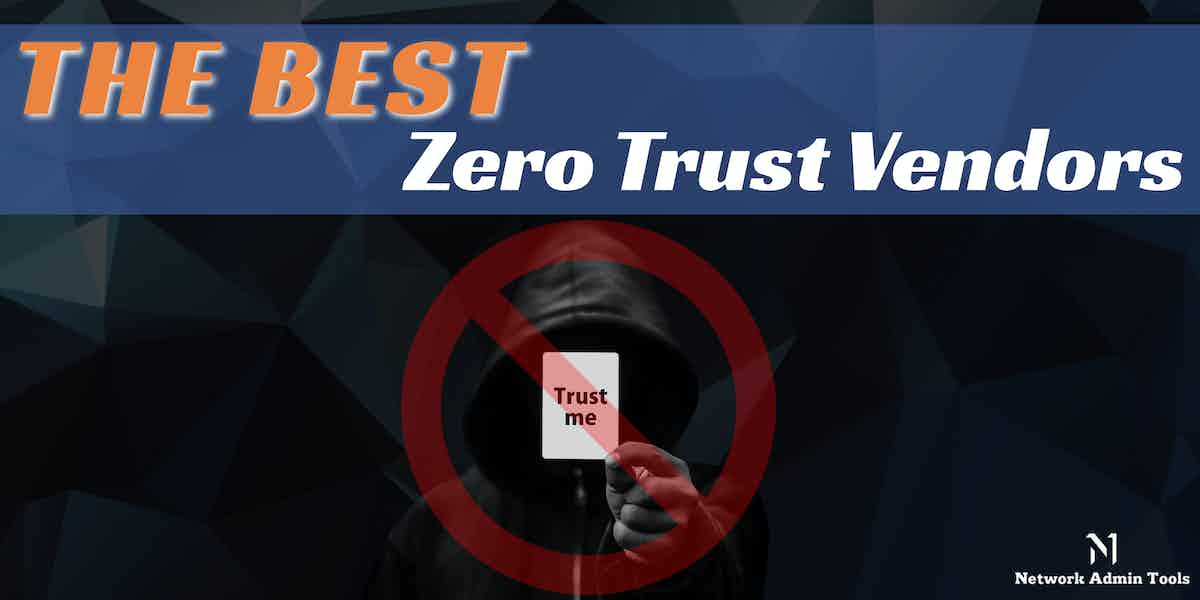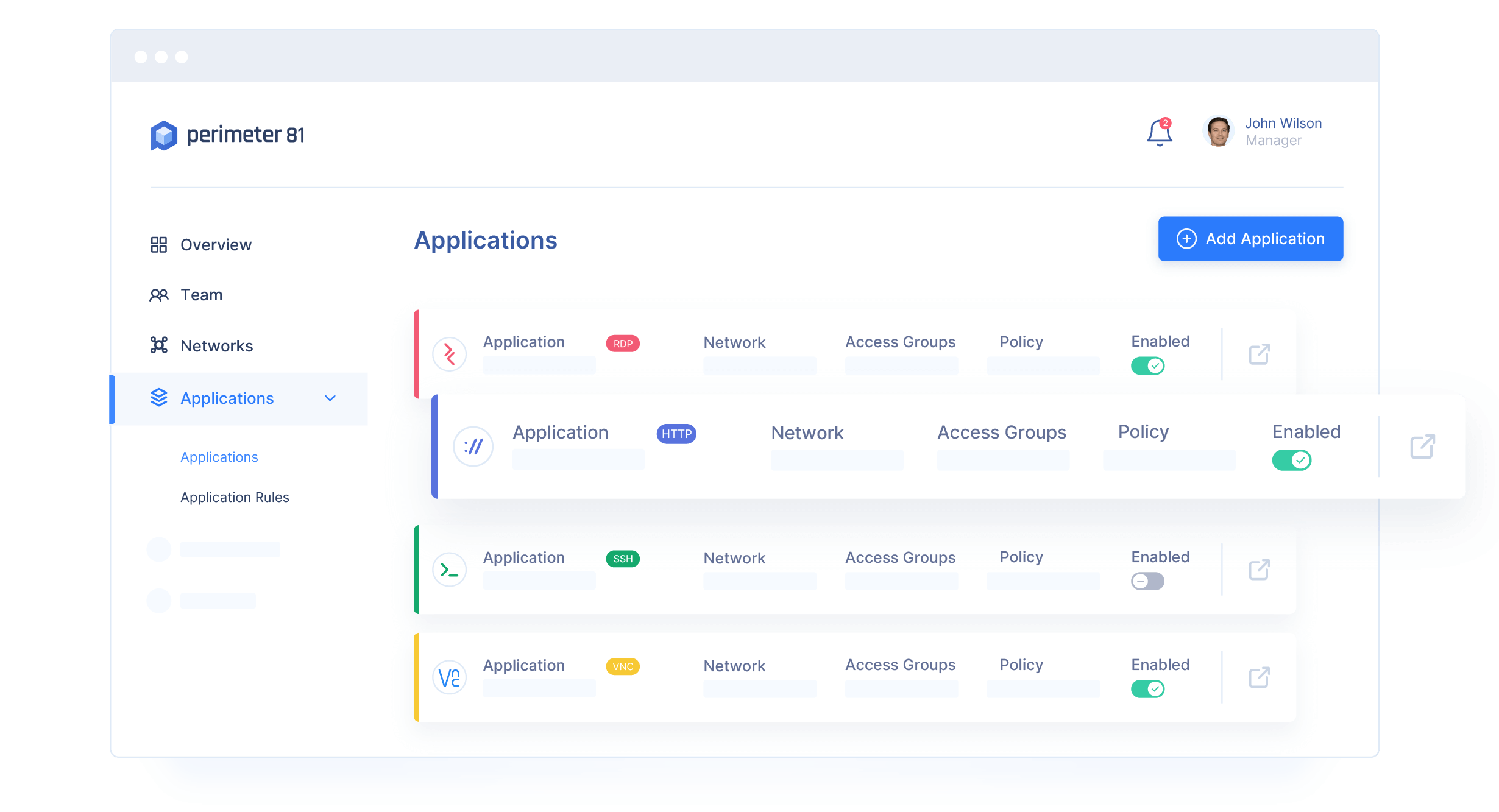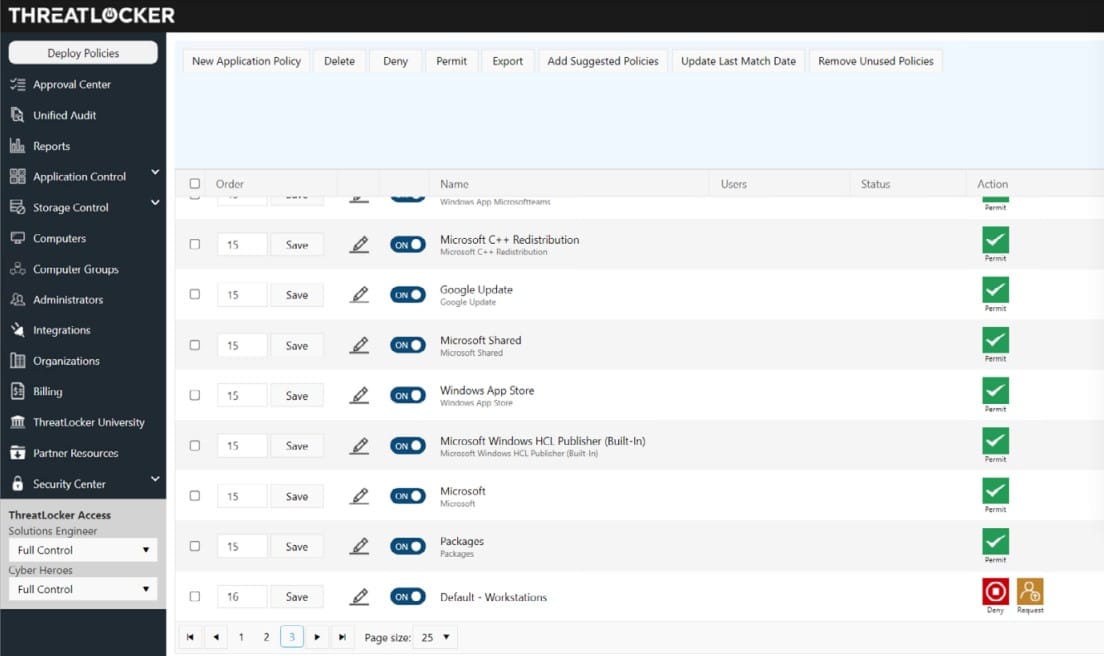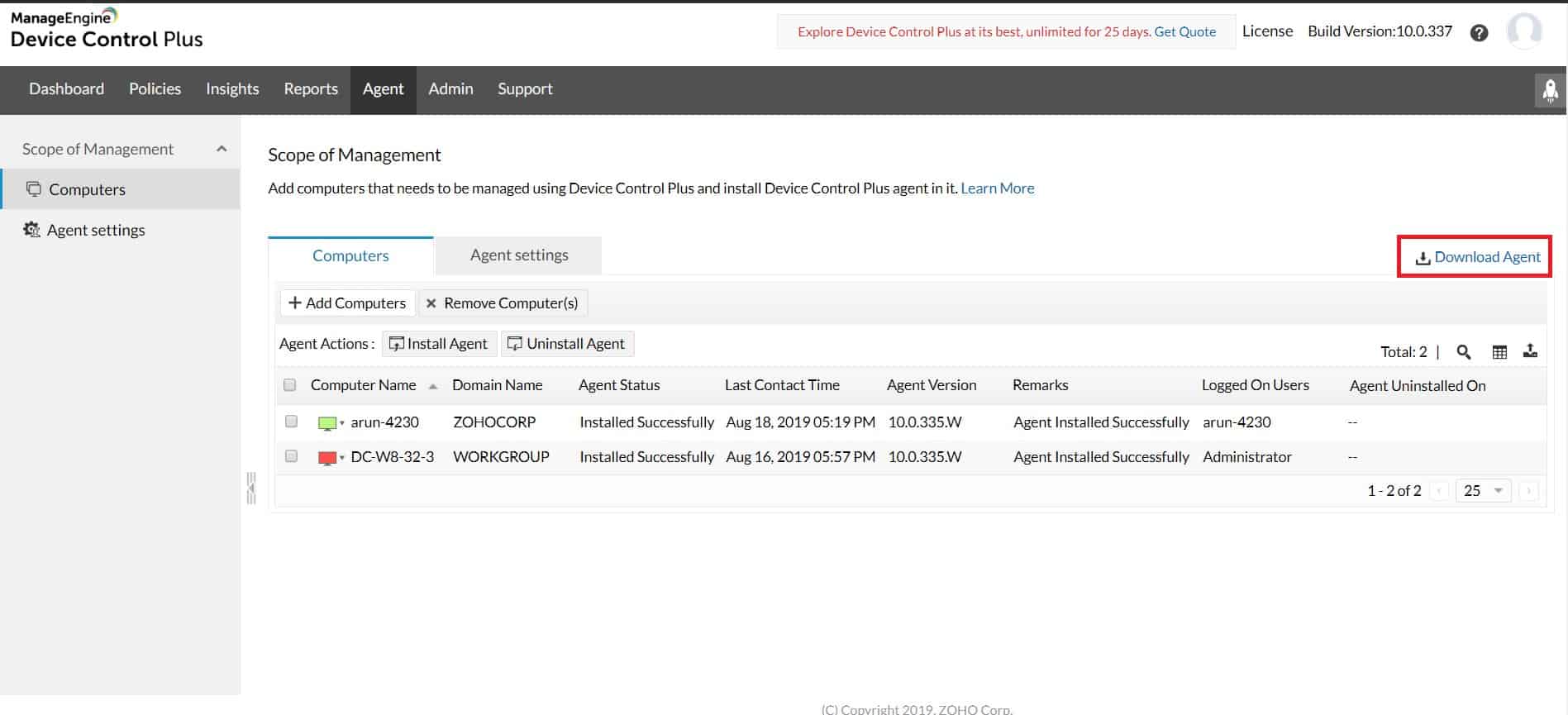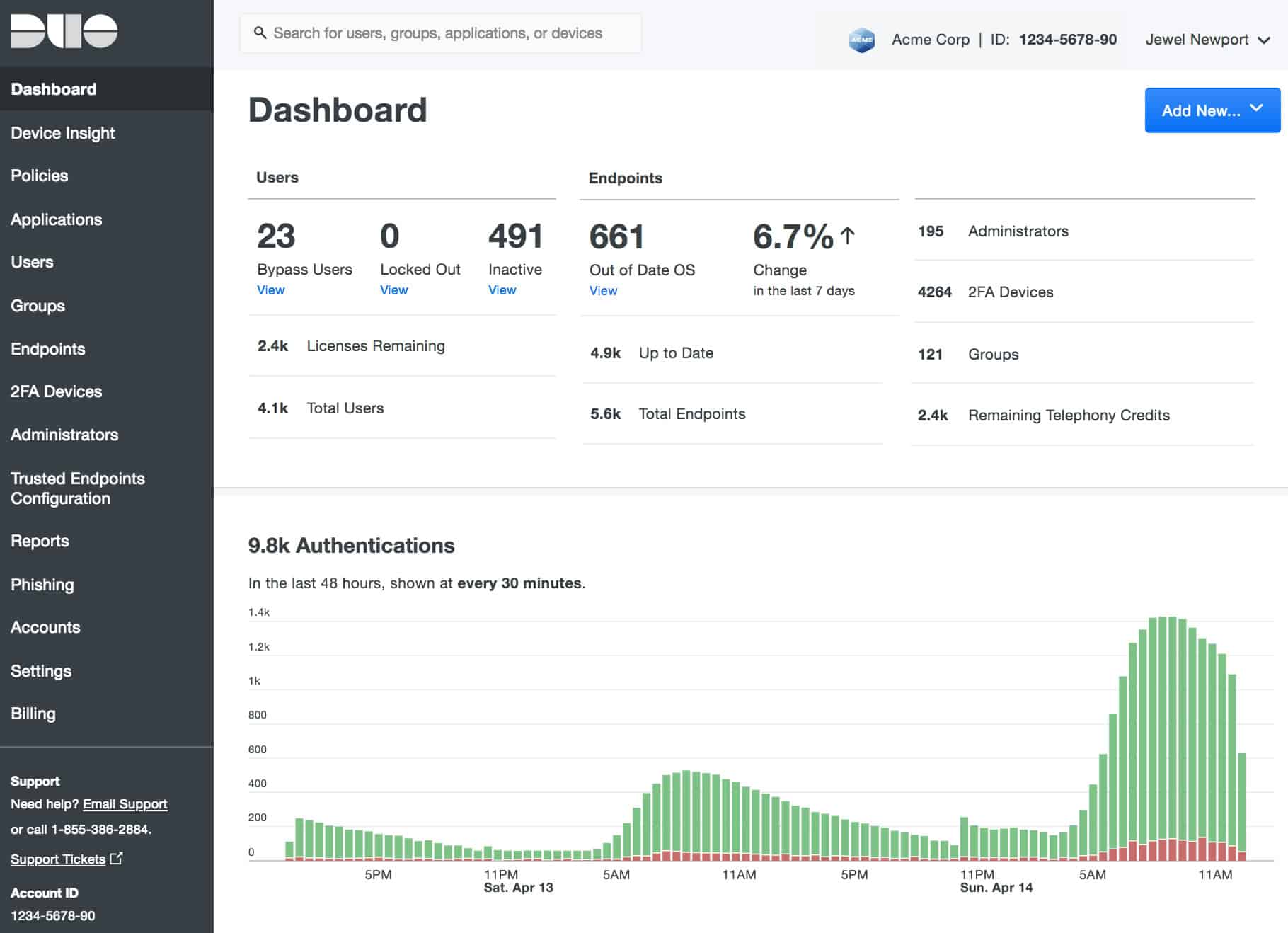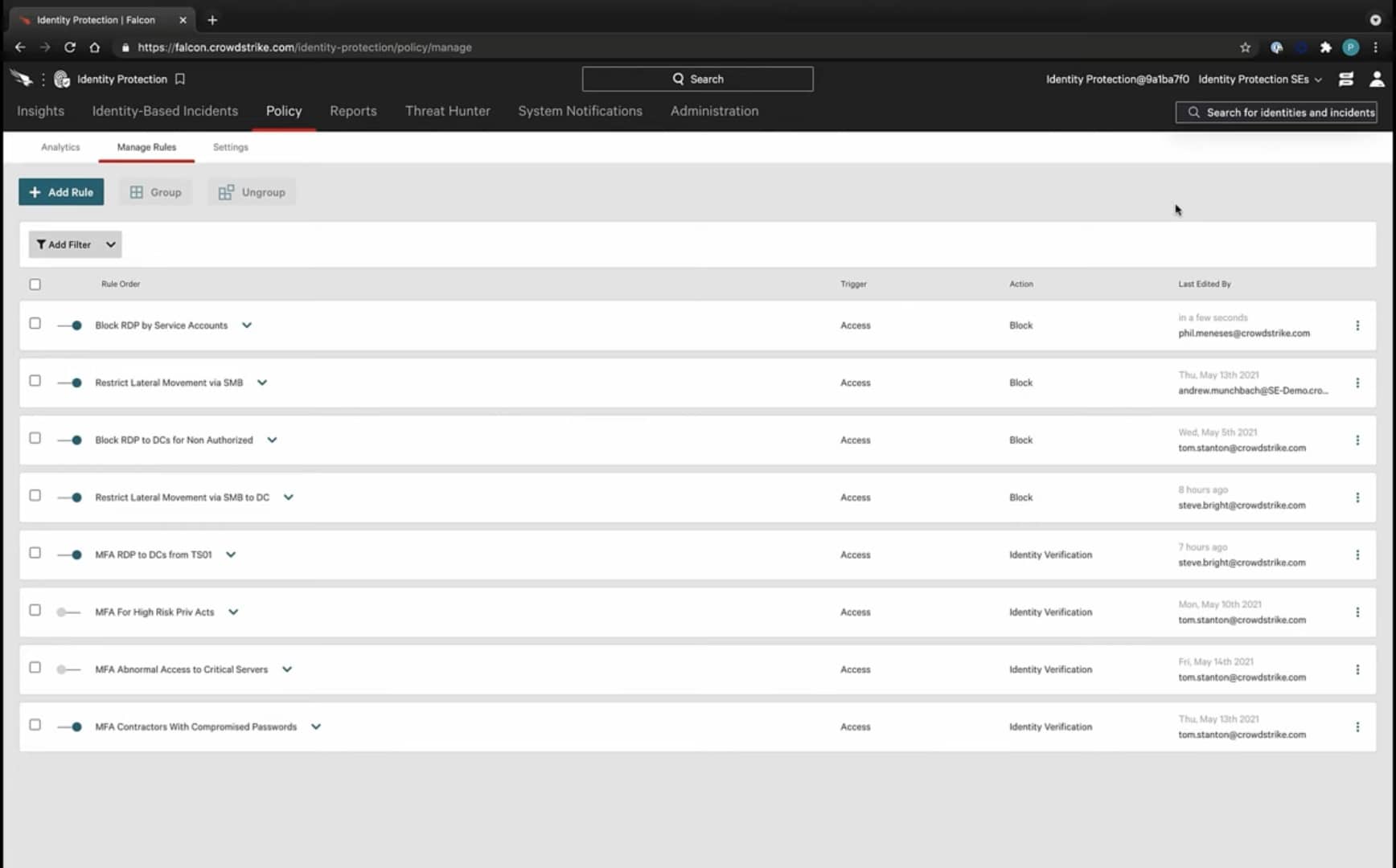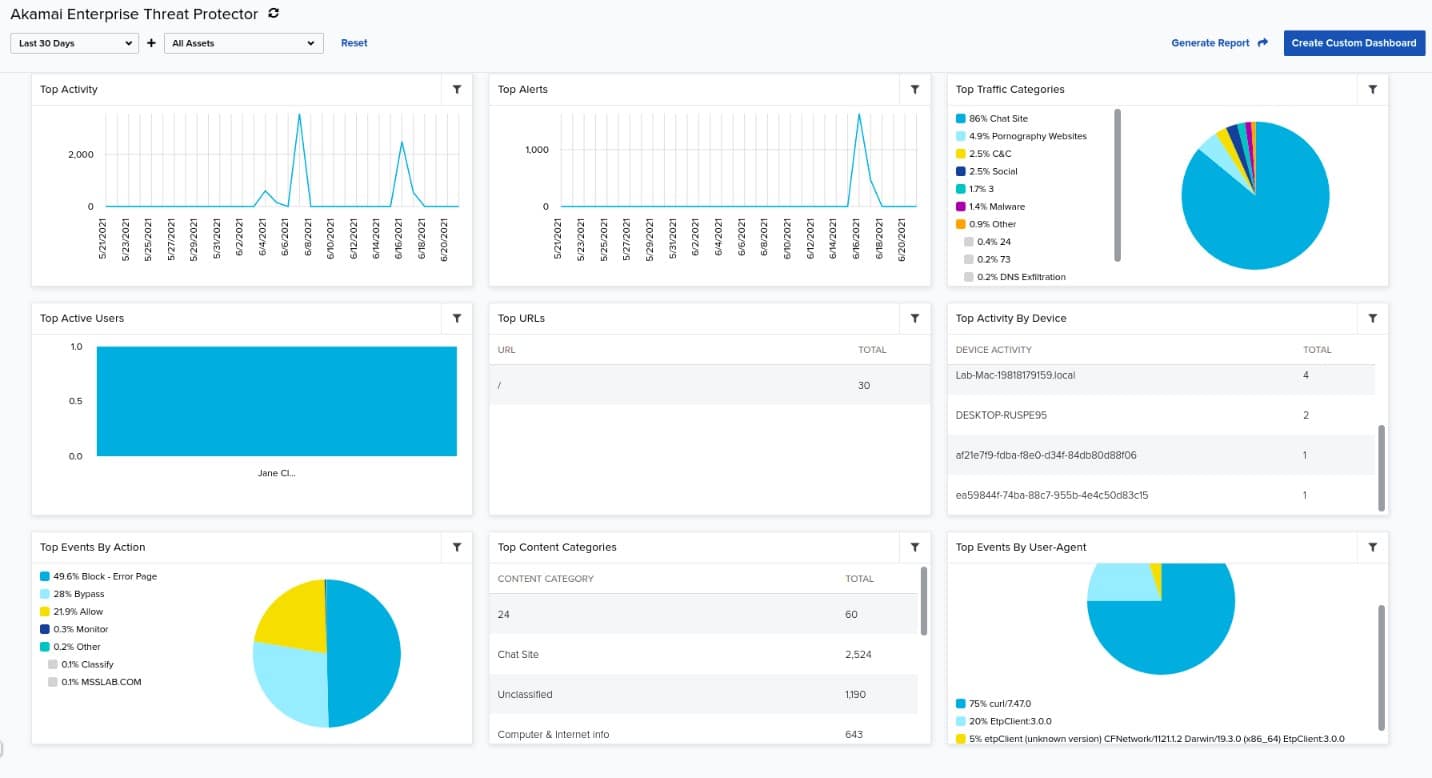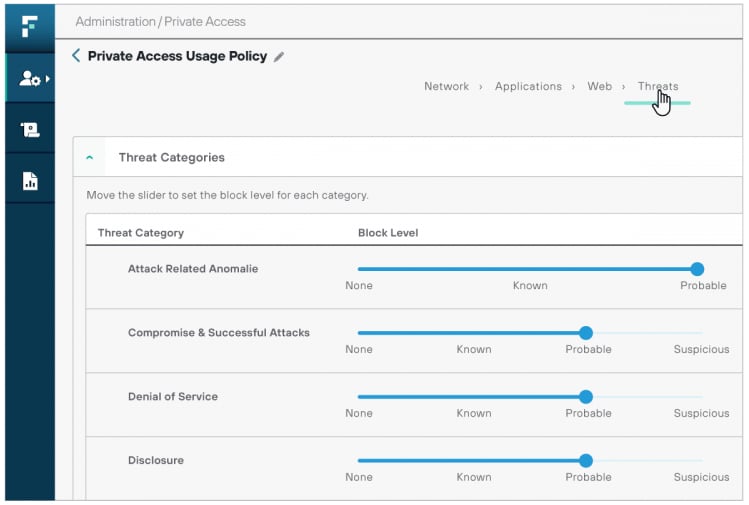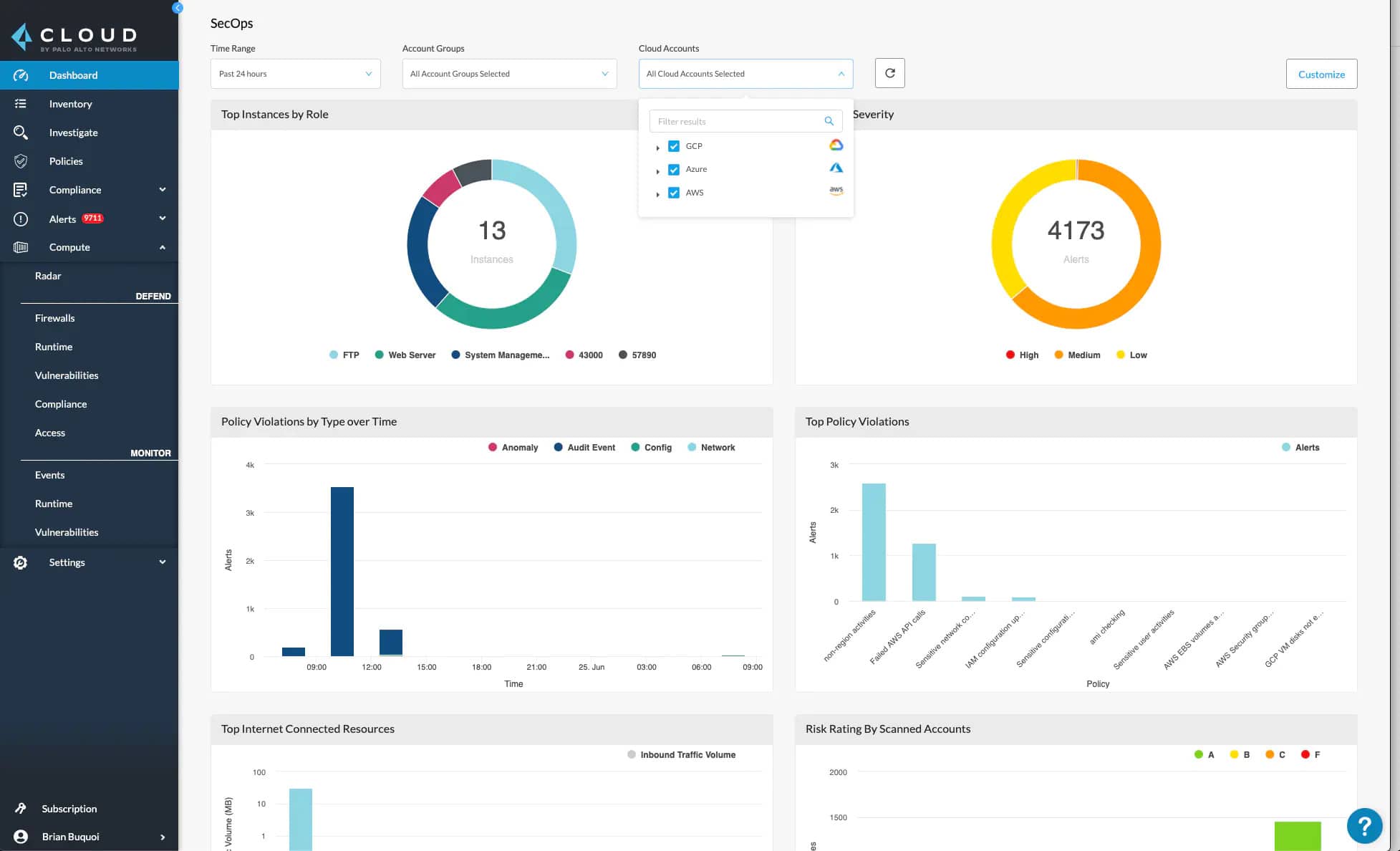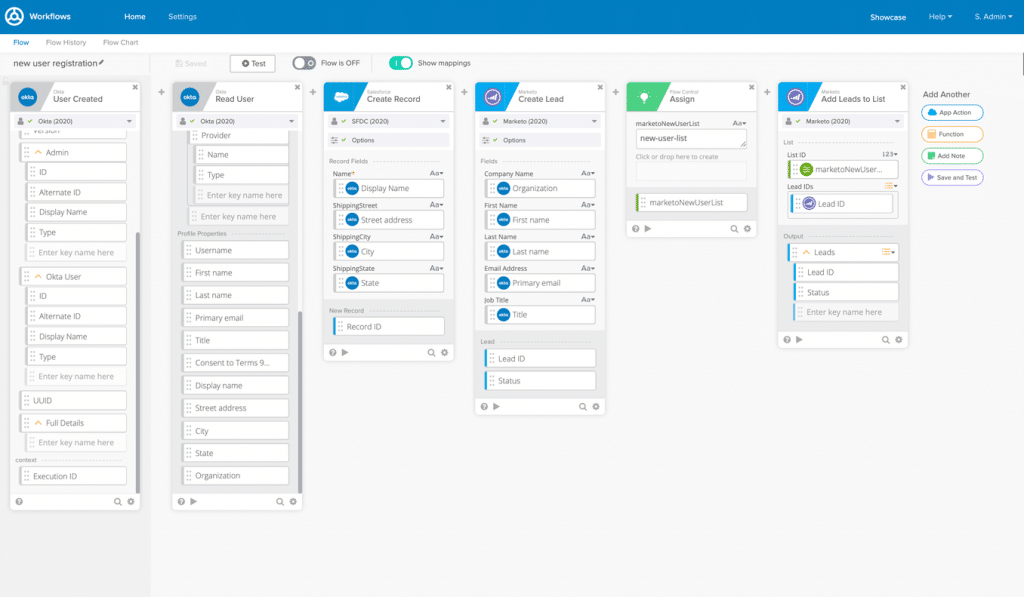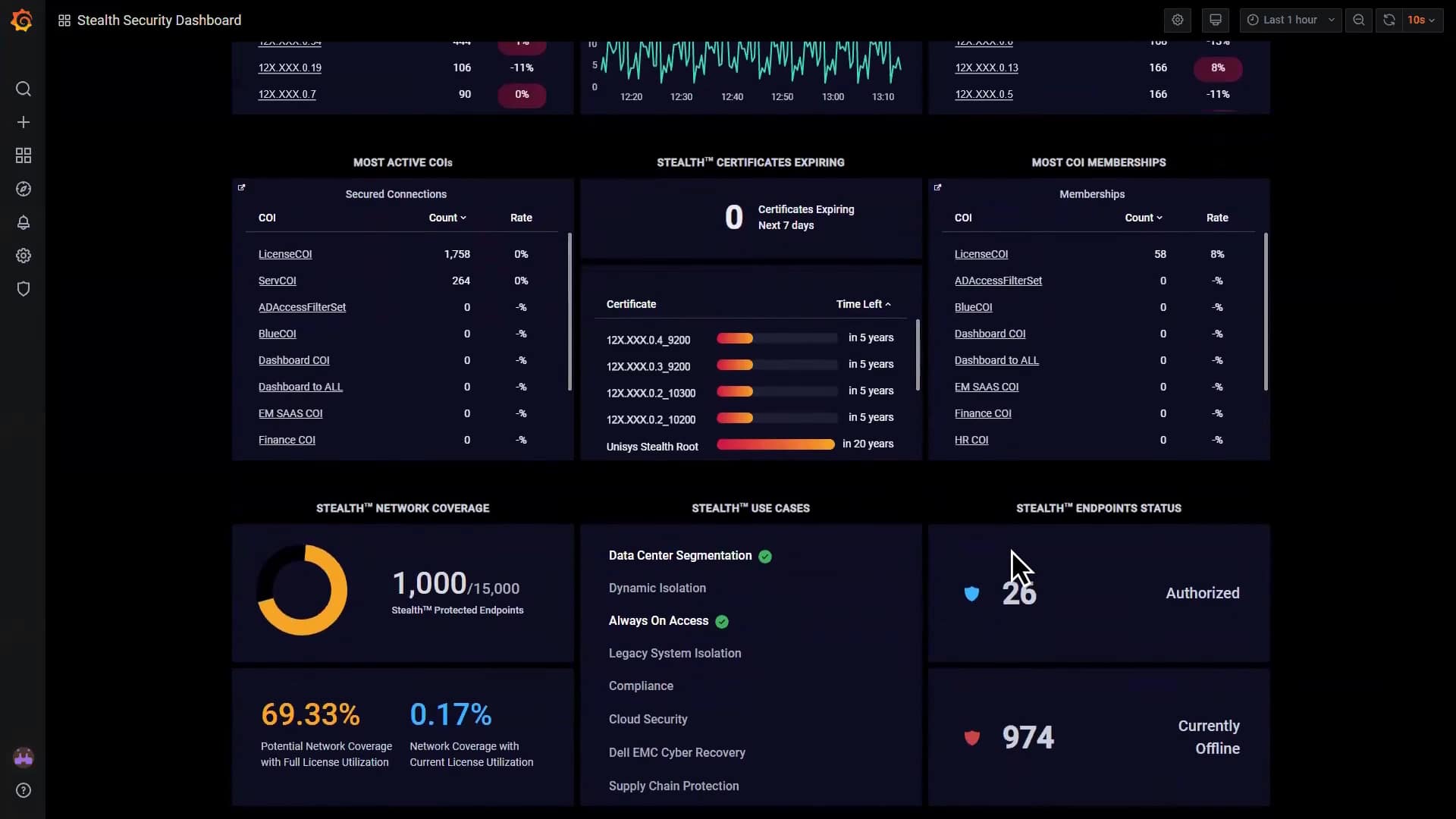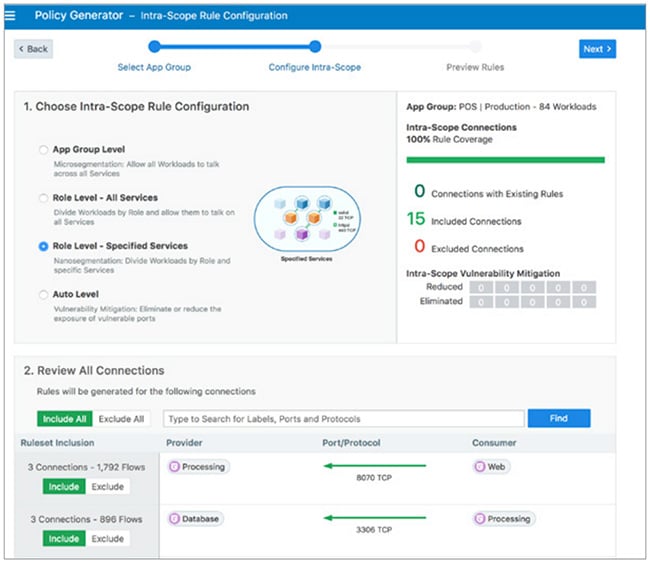Previously, all data security was managed within organizational premises. However, today the security parameter is no longer restricted to the office boundaries. People can easily access company assets using mobile devices and cloud software regardless of location. Businesses can transfer data between SaaS and IaaS applications, data centers, remote devices, IoT devices, and more, which increases the possibility of cyberattacks. Thus, the demand for a new security paradigm grew exponentially.
Zero Trust Security is a framework that ensures no device, user, or workload will be trusted by default regardless of your location. Only the authorized user identities will be permitted to access critical data.
Here is our list of the best zero trust vendors:
- Perimeter 81 – GET DEMO This package of cloud-based tools offers you the components to implement a range of security strategies, including ZTA for hybrid systems. Get a free demo!
- ThreatLocker – FREE TRIAL This cloud platform provides system lockdown, connection security, and access rights management that all adds up to a ZTA solution that is very easy to implement. Request a free trial!
- ManageEngine Device Control Plus – FREE TRIAL An easy-to-use platform that provides administrators with comprehensive control over data ports, file access, and access history. Download a free trial!
- UTunnel – GET DEMO A VPN-based security package that can be accessed as a service or self-managed. Access a free demo.
- Cisco Zero Trust This is a complete access rights solution that replaces your existing ARM and grants access on an application basis through microsegmentation.
- CrowdStrike Zero Trust This cloud-based system adds zero trust to your existing Active Directory accounts structure and maps out your cloud assets to define an access perimeter.
- Akamai Intelligent Edge A solution that operates as an access broker and is geared more toward cloud-only systems rather than on-premises resources.
- Forcepoint Private Access Suitable for businesses with home-based workers, this system presents a user portal that creates a single sign-on environment for all applications.
- Palo Alto Zero Trust Enterprise Framework This solution is formulated by combinations of Palo Alto products that are based around Palo Alto Cortex and your existing ARM.
- Okta Identity Cloud This environment replaces your existing ARM, taking access management to the cloud to protect hybrid systems, including mobile apps.
- Unisys Stealth This is a threat protection system for cloud assets that includes access rights management.
- Illumio Core This package virtualizes all of your applications and grants user access on an application-by-application basis.
Today, Zero Trust has turned out to be one of the most trusted security models with advanced features that prevent your network and data from cyberattacks at all times.
What is Zero Trust Security?
Zero Trust Security is a framework designed for security purposes that allows only authorized users to access sensitive information or critical systems. Zero Trust includes a variety of tools such as multifactor authentication (MFA), endpoint security, identity and access management (IAM), other policies and processes that enable companies to safeguard their data from cybercriminals.
Instead of purchasing one solution to secure your data, it is best to implement a Zero Trust Security framework with a combination of technologies, security tools, and processes. Also, the framework allows the operators to monitor the network at all times and alert on discovering any malicious network activity.
Another advantage of investing time and money into Zero Trust Security is compatibility with all network environments, including on-premises, cloud, or hybrid. The security concept follows the theory of ‘trust nothing and verify everything’. Unlike the traditional approach, zero trust monitors all network parts separately to prevent the system from data breaches.
Key Features of Zero Trust Security Software
The zero Trust Security concept has been in the market for a long time. Most vendors follow the approach to zero trust security as it comprises various features that guarantee access to only authenticated users and better security. Here are a few key features of Zero Trust Security Software.
- Multifactor Authentication (MFA) Multifactor authentication is a security procedure that requires users to validate using multiple methods of authentication. Apart from the traditional login method (username and password), users are also required to add a one-time password (OTP) sent to the mobile devices or a recovery email linked to the account. In some cases, the procedure also involves security questions (for example, “what is your educational qualification or college name?”). With so many cybercriminals on the run, it is best to have software that supports a Multifactor authentication system and offers advanced security. Zero Trust Security Software supports Multifactor authentication so that only trusted users can access the company data.
- Least-privileged access As per this feature, each employee or user must be assigned the lowest level of access to perform a job. This least-privileged access helps in blocking lateral movements and saves from data breaches. Also, it safeguards the employees from misusing any confidential information.
- Microsegmentation As per the microsegmentation process, all the networks are separated into different zones to isolate workloads and secure them with least-privileged access. This process also restricts the cyberattacks to only one section of the network, if it happens.
- Device discovery and identity protection Zero Trust Security Software updates administrators about each device location on the network and their credentials. This feature enables smooth functioning and eases the job for IT teams by discovering anomalies quickly. It alerts the IT teams to investigate if any abnormal or unusual activity happens, such as entering different credentials by the common user.
The Best Zero Trust Vendors
Methodology for selecting the best Zero Trust vendors
The zero-trust network access (ZTNA) solutions ensure that only identified authorized users will gain access to your crucial files and sensitive data. In simple terms, the security framework makes sure that no device or user will be permitted to access files by default, regardless of their location. In fact, you can find many zero-trust network access solutions in the market today, but what makes it a top choice? To make it easier for you to select the best zero-trust vendors, we have listed a few methodologies that you must consider.
- Check if the selected solution can identify or check the integrity of devices regardless of their location
- Does it support endpoint detection and response (EDR) or managed hunting services?
- Does it support behavioral analysis techniques?
- Does it support third-party integrations?
- Does it provide real-time monitoring of resources and data usage?
- Can it send instant alerts on detecting suspicious activity?
- Does it offer DDoS Protection or Account Takeover Protection?
- Check if it has the ability to protect your crucial data against viruses, malware, or other cyberattacks.
We have listed some of the best zero-trust solutions that restrict unauthorized users, secure your data, and eliminate any types of threats.
1. Perimeter 81 – GET DEMO
Perimeter 81 is a cloud-based platform of security tools. You can assemble these components into your preferred system protection strategy and a Zero Trust Access mechanism is part of that toolkit. ZTA seems to be a complicated concept. However, Perimeter 81 simplifies the strategy. This package just lets you add a list of permitted applications within a user’s VPN access app to implement both connection security and access controls simultaneously.
Key features:
- Controls user access to applications
- Applies VPN connection security
- Provides a cloud-based traffic hub
- Implements single sign-on
- Offers two-factor authentication
Why do we recommend it?
We recommend Perimeter 81 for its all-encompassing approach to security, offering robust features like Zero Trust Access, VPN connection security, and two-factor authentication. Its centralized security console allows for easy management, making it a one-stop solution for both cloud-based and on-premises applications.
The Perimeter 81 controls access to each application whether it is hosted on your own server or on a cloud platform. The central Perimeter 81 platform establishes a secure link to the application and no access can be made to that resource if it doesn’t come down the VPN tunnel. That block applies equally to outsiders and users who don’t have clearance for that application. Uncrackable encryption means that the access controls cannot be tricked or bypassed.
Who is it recommended for?
Perimeter 81 is recommended for businesses seeking a holistic security solution that integrates seamlessly with both on-site and cloud-based applications. It’s particularly well-suited for organizations that require strong access controls and the flexibility to adapt to a variety of network environments, from multi-site setups to remote work scenarios.
Pros:
- Centralized security console for multiple sites
- Applies strong access controls to remote access
- Treats on-premises and cloud-based apps equally
- Provides a firewall to block malicious traffic from outside the business
- Facilitates the creation of a secure access service edge (SASE)
- Single sign-on to ease the related login demands
Cons:
- Doesn’t provide sensitive data identification
EDITOR'S CHOICE
Perimeter 81 is an easy-to-deploy Zero Trust Network Access solution that protects your network and endpoints against malicious infections. The trusted solution controls access to applications and protects your resources from threats.
It uses two-factor authentication, traffic encryption, as well as identity-based access rules to keep your networks protected at all times. With this powerful solution, users can also watch over all web and employee activities, and timely identify and block harmful sites.
Another advantage of Perimeter 81 over other Zero Trust Network Access solutions in the market is you can deploy multiple protocols at once based on the connection and environment. You can even integrate it with other solutions and services. Further, access policies can be customized specifically for users and their devices.
Perimeter 81 satisfies the requirement for a fresh perspective on security infrastructure for modern digital organizations. It fully complies with the strict requirements for software security compliance and offers continuous resource protection from a single dashboard
Download: Schedule a free demo
Official Site: https://www.perimeter81.com/zero-trust-application-access
OS: Cloud based
2. ThreatLocker – FREE TRIAL
ThreatLocker is a cloud-based system that provides a method to easily assemble a Zero Trust Access policy. It builds up from a “deny all” stance, which ensures that you don’t accidentally allow intruders in or let malware operate through oversight. The administrator assembles an Allowlist that unblocks specified software. All other systems are unable to run, so you will never be taken by surprise by ransomware or viruses.
Key Features:
- Cloud-resident console that can control access to on-site devices and cloud services
- ‘Deny All’ stance that prevents unauthorized software from running
- Connects users, applications, and data locations in its access rights management
Why do we recommend it?
We recommend ThreatLocker for its robust, cloud-based Zero Trust Access policy that starts with a “deny all” approach, minimizing the risk of unauthorized access or malware attacks. Its versatility in compliance management and detailed logging capabilities make it a comprehensive security solution.
Micro-segmentation or ZTA is implemented by Application Fencing. This specifies access rights by linking user permissions to data access permissions, which can only be implemented through specific software. The platform also implements USB device management through a module called Storage Control. This blocks all USB devices from attaching by default and then enables the administrators to authorize specific devices by serial number.
Who is it recommended for?
ThreatLocker is ideal for organizations that require stringent security measures and are subject to compliance standards like PCI DSS, HIPAA, and GDPR. Its multi-platform support for Windows, macOS, and Linux makes it a versatile choice for businesses with diverse endpoint environments.
Pros:
- Protects data from unauthorized access
- Logs all data access activity for compliance auditing
- Compliance management for PCI DSS, HIPAA, and GDPR
- Reduces risk by blocking all actions by default
- Controls endpoints running Windows, macOS, and Linux
Cons:
- No on-premises version
You can register for a free trial and custom quote.
3. ManageEngine Device Control Plus – FREE TRIAL
ManageEngine Device Control Plus employs a zero-trust approach to file access, permitting only authorized access and monitoring all attempts and changes for audit purposes, providing a distinction between an insider attack and an honest mistake. Device Control Plus enables system administrators to establish access policies at the global, group, or individual level to safeguard data while still allowing access when required.
Key Features:
- Fine-grained control of devices on an enterprise scale
- Support for device orchestration and automated provisioning
- Strong integration with other ManageEngine solutions
Why do we recommend it?
We recommend ManageEngine Device Control Plus for its zero-trust approach to file and device access, which combines granular control with strong auditing capabilities. Its seamless integration with other ManageEngine solutions and intelligent alerting features makes it an all-in-one solution for safeguarding enterprise data and devices.
Device Control Plus allows administrators to monitor and control access to external devices such as USB drives and external hard drives, ensuring that only authorized devices are used on the network. It also offers detailed reporting and alerts to notify administrators of any suspicious or unauthorized access attempts. With the ability to grant or revoke access at a granular level, Device Control Plus provides a powerful solution for securing data and devices in any organization.
Who is it recommended for?
ManageEngine Device Control Plus is ideal for organizations looking for a scalable, comprehensive solution for device and data security. It is particularly suitable for businesses that require fine-grained control over device access at different organizational levels and those who prioritize seamless integration with existing management solutions.
Pros:
- Easy to use, with over 200 customizable widgets for creating unique dashboards and reports
- Automatically detects, inventories, and maps new devices
- Utilizes intelligent alerting to decrease false positives and prevent alert overload on larger networks
- Offers multiple alerting channels, including email, SMS, and webhook
- Seamlessly integrates with other ManageEngine products
Cons:
- May take some time to fully learn and master
4. UTunnel – GET DEMO
UTunnel is a versatile VPN service that caters to both personal and business users. It offers a range of features, including Zero Trust access with Mesh Networking, Single Sign-On (SSO) integration, and Multi-Factor Authentication. The service is designed to provide secure and seamless remote access to business network resources, making it an ideal choice for companies looking to enhance their cybersecurity measures.
Key Features:
- Easy-to-use web-based management console
- Site-to-site VPN connectivity
- Multi-cloud platform support (AWS, Azure, Google Cloud)
- Strong encryption protocols (OpenVPN, IPSec, WireGuard)
- Cross-platform compatibility (Windows, macOS, Linux, iOS, Android)
- Centralized user and device management
Why do we recommend it?
UTunnel is recommended for its robust security features, flexible deployment options, and user-friendly interface. It provides a reliable and affordable VPN solution for both personal and business users, ensuring secure remote access and enhanced cybersecurity.
UTunnel’s user-friendly interface and affordable pricing make it accessible to less technical users who need a reliable VPN solution for personal use.
Users can choose to set up their own VPN servers or opt for cloud-based solutions, depending on their specific needs. The service also supports advanced features like split tunneling, custom DNS servers, and centralized network management, which are particularly beneficial for business users. Despite some minor drawbacks, such as limited location choices and basic apps, UTunnel remains a strong contender in the VPN market, offering a comprehensive and secure solution for various use cases.
Who is it recommended for?
UTunnel is ideal for businesses seeking to improve their network security and remote access capabilities. It is also suitable for individual users who need a dependable VPN service for personal use, offering a balance of advanced features and ease of use.
Pros:
- Scalable for small to large organizations
- Affordable pricing plans
- Zero-trust security model
- Seamless integration with existing infrastructure
- 24/7 customer support
- Custom DNS and split tunneling options
Cons:
- Self-hosting requires technical skills
Access a free demo.
5. Cisco Zero Trust
Cisco Zero Trust is a zero-trust security solution that offers security to the entire network and enforces least-privileged access. It acquired Duo Security in 2018, which further provided strong user authentication, visibility, and device security to users. This reinforcement reduced the risk for data breaches by adding multiple two-factor authentication methods.
Key Features:
- Offers consistent security
- Better Network Visibility
- Offers logs and reports in detail for analysis
- least-privileged access
- Supports SD-Access policy
- Microsegmentation
- Alert system
Why do we recommend it?
We recommend Cisco Zero Trust for its comprehensive approach to network security, offering least-privileged access, strong authentication, and detailed reporting. The platform’s ability to automate threat containment and provide granular user verification makes it an exceptional tool for bolstering enterprise security.
Also, it has an easy-to-use and intuitive interface with some of the best analysis and reporting tools.
The platform enables all devices and applications to speed up remediation and adds extra network security to protect against cyber-attacks. It monitors all the traffic, including the ones that do not include threats. Cisco Zero Trust ensures full protection to your organization by analyzing all risky behavior, single sign-on, granular user verification, and more.
Who is it recommended for?
Cisco Zero Trust is best suited for organizations that require an end-to-end security solution with robust features like microsegmentation, least-privileged access, and multiple authentication methods. It’s particularly useful for businesses that need seamless integration with existing infrastructure and a consistent security approach, regardless of location.
Pros:
- Provides full security to the entire network
- Least-privileged access enforcement
- Prevents unauthorized access
- Protects against gaps in visibility
- Automates threat containment
- Users can easily mitigate, detect, and respond to risks found in the environment
- Reduces attack surface with Microsegmentation technology
- Seamlessly integrates with your infrastructure
- Offers consistent security regardless of location
Cons:
- Implementation and deployment are time-consuming
6. CrowdStrike Falcon
CrowdStrike Falcon is a unified cloud-based endpoint protection solution that instantly detects threats and provides a solution. It supports endpoint detection and response (EDR) for complete security coverage and continuous managed hunting services with deep visibility into each network. The platform also briefs administrators with insightful reports.
Key Features:
- Faster Detection of Malware
- IOA Behavioral Protection
- Granular Endpoint Visibility
- Provides Security Threat Alerts
- Real-Time Application and System Inventory
- Whitelisting & Blacklisting
- Endpoint Detection features
- API Integration
- Insightful reports and analysis tools
- Access Control
- Bandwidth Monitoring
- Application Security
Why do we recommend it?
We recommend CrowdStrike Falcon for its robust endpoint detection and response (EDR) capabilities, as well as its real-time visibility into networks. Its unified cloud-based architecture makes it scalable and easy to deploy, eliminating the need for additional hardware or servers.
It comprises various behavioral analysis techniques that aid businesses in the quick detection of malicious activities. Further, CrowdStrike Falcon includes multiple prevention features that protect your company data from attackers at all times. It hardly takes any time for the solution to get fully operational. Also, it requires no additional hardware or servers.
The monitoring capabilities and alert system provide instant updates in case of breaches or other security issues.
Who is it recommended for?
CrowdStrike Falcon is ideal for businesses looking for a comprehensive endpoint protection solution that offers both quick threat detection and in-depth analysis. It is particularly suited for organizations that require real-time monitoring, granular endpoint visibility, and seamless API integration.
Pros:
- Helps detect malware and other threats
- No requirement for installing additional hardware and servers
- Provides enhanced performance
- Continuously records activities and scrutinizes information for analysis
- Provides quick insights and detailed reports
- Provides real-time visibility into each network
- Helps detect fileless attacks
- Automatic device discovery
Cons:
- Some users found it difficult to adapt to the look and feel of the platform
You can register for a 15-day free trial.
7. Akamai Intelligent Edge
Akamai Intelligent Edge Platform is known for securing applications and delivering a better digital experience worldwide. It is one of the best threat protection solutions available that secure APIs and offers features like single sign-on (SSO) and Multifactor Authentication.
Key Features:
- DDoS Protection
- Account Takeover Protection
- API security
- Serverless Computing
- Real-time notifications
- Multifactor Authentication
- Certificate Provisioning System
- Lifecycle management
- Single Sign-On (SSO)
- Log Delivery
- Reporting tools
Why do we recommend it?
We recommend Akamai Intelligent Edge for its comprehensive threat protection capabilities, including advanced DDoS mitigation and API security. Its cloud-based global architecture allows for real-time content protection and efficient threat management through an intuitive dashboard.
The cloud-based system operates globally and implements DDoS mitigation and other security options that make it a top choice. Each server runs complex algorithms to process requests in Akamai and supports computing and content delivery to improve speed.
Who is it recommended for?
Akamai Intelligent Edge is suitable for businesses requiring robust, global security solutions that protect against a variety of threats. It is especially useful for organizations that manage APIs, require advanced DDoS protection, and value real-time notifications and customizable alert systems.
Pros:
- Works great with all APIs
- Offers better visibility to web applications and cloud security
- Generates custom reports
- Better insights on bot activities
- Intuitive dashboard that eases the process of monitoring
- Users can manage threats from its dashboard
- Provides real-time content protection
- Customizable alert system
- Supports advanced DDoS mitigation and command center for remediating threats
- Easy sign-in features for authorized users
Cons:
- The valid requests often get blocked by the default rules of Akamai
- All the data is stored in a third-party cloud which can be risky
8. Forcepoint Private Access
Forcepoint Private Access is a powerful web protection solution that provides full web access control and doesn’t require a VPN. The flexible zero-trust security platform protects your data against viruses, malware, and other cyber attacks. It is one of the best designs for remote users who access private apps. With Forcepoint Private Access, users no longer need to worry about the complexities of VPNs.
Key Features:
- Seamlessly manages and provides remote users quick access to private apps
- Each user gets private access to internal apps. Thus, preventing the network from threats
- Offer full control and better visibility to private apps
- Users can use private apps from any location
- Real-time monitoring of resources and data usage
Why do we recommend it?
We recommend Forcepoint Private Access for its innovative approach to zero-trust security that eliminates the need for a VPN. The platform’s built-in anti-intrusion technology and holistic security infrastructure make it a top choice for remote users accessing private applications.
Also, the platform offers better visibility, personalized access, and control over data usage and prevents attackers from breaking into the network. Users can further monitor the resources and their usage continuously with the help of Forcepoint Private Access.
It is an all-in-one cloud platform that manages the security of web applications, cloud services, and private applications via a single console. Unlike other private access products, Forcepoint Private Access has built-in anti-intrusion technology that helps protect sensitive information from threats at all times and minimizes the need for scaling up VPN infrastructure.
Who is it recommended for?
Forcepoint Private Access is ideal for businesses with remote workforces or distributed teams who need secure, hassle-free access to private applications. It’s also a good fit for organizations that require real-time monitoring of resources, streamlined compliance, and robust web threat protection.
Pros:
- No need for a VPN to use private company resources
- Users get access to holistic security infrastructure
- Enforces security policies
- Streamlined Compliance
- Protects against web threats
- Allows configuration and customization of policies
- Available at a lower cost
- Enables remote users to access private applications without any complexities or VPN
- Allows monitoring of device usage and resource consumption
- Better network visibility
- Discovers threats faster
Cons:
- Storing data in third-party public clouds can be risky.
- Forcepoint Private Access is difficult to implement.
9. Palo Alto Networks
Palo Alto Networks is a trusted cybersecurity software with a zero-trust approach. The platform has a centralized management console with advanced firewalls and cloud-based offerings. It is a cloud-based service that offers better network visibility, automatic threat response, and insightful reports to the users.
Key Features:
- Application-based policy enforcement
- Secure Sockets Layer (SSL) protocol
- Configures and enforces firewall policies
- Centralized management console
- Threat prevention
- URL filtering options
- Easy and secure global login
- Offers insightful reports and logs
- Intuitive web interface
- Full Network Visibility
Why do we recommend it?
We recommend Palo Alto Networks for its robust zero-trust approach that includes next-generation firewalls, cloud environment monitoring, and automatic threat response. The centralized management console and extensive reporting capabilities further enhance its appeal.
They provide next-generation firewalls for blocking all sensitive data transfers. Also, have an extended life with flexible chipsets that are easy to upgrade and reconfigure.
Further, the platform provides extensive reports and logs with detailed information on each network. Palo Alto Networks also supports URL filtering features.
Who is it recommended for?
Palo Alto Networks is suitable for organizations looking for a comprehensive cybersecurity solution with high levels of network visibility. Its capabilities make it ideal for businesses that need to manage and analyze cloud environments, containers, and SD-WANs, as well as those requiring a responsive technical support team.
Pros:
- Offers Insightful reports to investigate threats
- Responsive technical support
- Cloud Environment, containers, and SD-WAN monitoring and analysis
- Reliable next-generation firewall
- Comprises local storage capabilities that enable companies to store logs locally
- Proper Network Visibility
- Automatic Threat Response
Cons:
- Implementation is time-consuming in some cases
- The product involves frequent updates
10. Okta Identity Cloud
Okta Identity Cloud is an Identity and access management (IAM) service that verifies all workforce and customer identities to protect on-premise and cloud applications. On average, an employee uses multiple technologies and applications due to which the security is often compromised. With this integrated identity solution, your data remains secure at all times. The platform helps connect authorized people with the right technology and offers flexibility in access management.
Key Features:
- Deprovisioning workflow
- Pre-integrated applications
- Single Sign-On
- API Access Management
- Multi-Factor Authentication
- Universal Directory
- Lifecycle Management
- Compatible with all systems and browsers
Why do we recommend it?
We recommend Okta Identity Cloud for its comprehensive Identity and Access Management (IAM) features, including Single Sign-On and Adaptive Multi-Factor Authentication. The platform offers robust authentication processes, making it a strong choice for both workforce and customer identity protection.
It supports Single Sign-On (SSO), Adaptive Multi-Factor Authentication, API Access Management, Universal Directory, Lifecycle Management, and other features that make it a top choice. Okta Identity Cloud is compatible with all systems and browsers and allows smooth working on mobile devices as well. Centered around zero-trust policies, it is one of the best options for your employee’s security.
Who is it recommended for?
Okta Identity Cloud is ideal for organizations that have a complex tech stack and require seamless integration capabilities. It’s also suitable for businesses looking to manage multiple identity sources, or those that operate in cloud, mobile, or hybrid environments, requiring strong security without sacrificing user experience.
Pros:
- Uses strong authentication processes to protect data from security breaches
- Offers more visibility to the traffic
- Provides seamless customer experience
- Offers faster integration tools to promote productive collaboration
- Accelerates scaling with universal directory and SSO tools
- Provides incredible flexibility
- Supports cloud, mobile, and hybrid environments
- Aids businesses in managing multiple identity sources using Universal Directory
Cons:
- Setting up at the initial stage can be a little complex for some users.
11. Unisys Stealth
Unisys Stealth is a software suite with excellent cybersecurity solutions and services designed to isolate threats and reduce the possibility of a data breach. Attackers are always on the move. But, with the help of Unisys Stealth’s exclusive features, administrators can separate the critical information and add a stronger shield. Thus, making it difficult for attackers to discover and damage sensitive information.
Key Features:
- Customized data micro-segmenting and security features
- Encrypts application traffic for better security
- Allows to set your permissions
- Biometric-based identity management
- Communities of interest (COI) membership
- User-friendly API integrations
- Supports advanced automation features
- Live discovery options
- Multi-factor authentication
Why do we recommend it?
We recommend Unisys Stealth for its innovative approach to cybersecurity, particularly its customized data micro-segmenting and biometric-based identity management features. These features offer a robust shield against various types of cyberattacks, including phishing and social engineering.
Unisys Stealth helps eliminate downtime. Also, the platform provides real-time monitoring and immediate isolation of devices that act suspiciously.
Further, a new feature has been introduced to the latest version of Stealth – Biometric Identity. This feature helps the operators to recognize the user’s identity using face, voice, behavioral, fingerprint, or iris recognition and reduce the risks.
Who is it recommended for?
Unisys Stealth is best suited for organizations that prioritize high-level security measures and need real-time monitoring capabilities. It’s particularly useful for businesses that handle sensitive information and require advanced identity verification methods, such as biometrics, to secure their data.
Pros:
- Intuitive user interface with a customizable dashboard
- Helps eliminate downtime and reduces the impact of attacks
- Minimizes risks associated with the data breach
- Offers biometric controls
- Quick isolation of suspicious users
- Protects from data exfiltration
- Keeps your system safe from phishing or social engineering attacks
- Unisys Stealth is quick to install and deploy a software solution
Cons:
- Supports less network traffic analysis capabilities
- Does not support on-premises deployment features for Mac devices
12. Illumio Core
Illumio Core is another zero trust security solution that protects businesses against various online threats. It uses an enterprise-level security policy management toolkit to protect cloud environments and application dependency maps to promote network traffic, further creating ideal segmentation policies. Various enterprise-level businesses prefer Illumio Core to get vulnerability insights. Also, it offers a comprehensive virtual enforcement node (VEN) that enables full visibility to operators.
Key Features:
- Comprises a security toolkit that offers multi-cloud protection
- Supports data encryption tools
- Policy Compute Engine (PCE) to streamline procedure management.
- Threat remediation capabilities
- Offers complete visibility to the system and company assets
- Real-time application dependency map
- Core Services Detector
- Well-designed graphical interface
- Supports Application programming interface (API)
- Automated segmentation and enforcement
Why do we recommend it?
We recommend Illumio Core for its enterprise-level security policy management toolkit and real-time application dependency mapping. These features allow for dynamic micro-segmentation, providing robust protection for multi-cloud environments.
Who is it recommended for?
Illumio Core is ideal for enterprise-level businesses that require intricate security measures for their cloud environments. It’s particularly beneficial for companies that need complete visibility into their network traffic and those that prioritize automated segmentation and policy enforcement.
Pros:
- Easy-to-use and quick micro-segmentation solution
- Offers complete visibility to network traffic
- Offers real-time application insights
- Quick generation of segmentation policies
- Provides great customer support
- Restricts full control only to trained administrators
- Administrators can run the software solution in test mode
- Enables companies to analyze historical traffic records between workloads
Cons:
- Needs to work on reporting as users require to filter them to get accurate information
- Application owners cannot implement their proposed rules to Illumio Core. Only the network or security team can approve the rules.
Final Thoughts
Today, the chances of threats are high as most of the data is available on the clouds. Thus, each company must look for tools or platforms that enable a more secure environment and protect sensitive information from data breaches. Zero Trust Security Solutions offers some of the best security framework approaches.
The platform considers each application, user, or device as untrustworthy regardless of their location and purpose. It allows only authorized users to access the crucial data by performing multiple methods of authentication. It also supports identity and access management (IAM) services and other policies to protect company data from cybercriminals.
Administrators can also monitor the network at all times using Zero Trust Security Solutions. Multifactor Authentication (MFA), Least-privileged access, Microsegmentation, Device discovery, and identity protection are a few key features of Zero Trust Security.
Many organizations have shifted to these platforms as they offer a wide range of security benefits. With the help of some of the above-listed zero trust vendors, the security operations center administrators can get better network visibility, improved monitoring solutions, and alert systems. Further, it helps the administrators to get an idea of how many users, devices, or applications are a part of the infrastructure and where these resources are stored.
Another key advantage of using Zero trust is the administrators can deploy single sign-on (SSO) tools and eliminate the issue of password mismanagement. Perimeter 81, ManageEngine Device Control Plus, CrowdStrike, Cisco, Akamai Intelligent Edge, Palo Alto Networks, Okta Identity Cloud are a few trusted zero-trust security platforms. We have highlighted the features, pros, and cons of each platform.
Now, constantly authorize and authenticate users on the network before permitting them to access the company data. Follow the top zero trust security solutions, compare, and select the one that suits your requirement and the budget.

